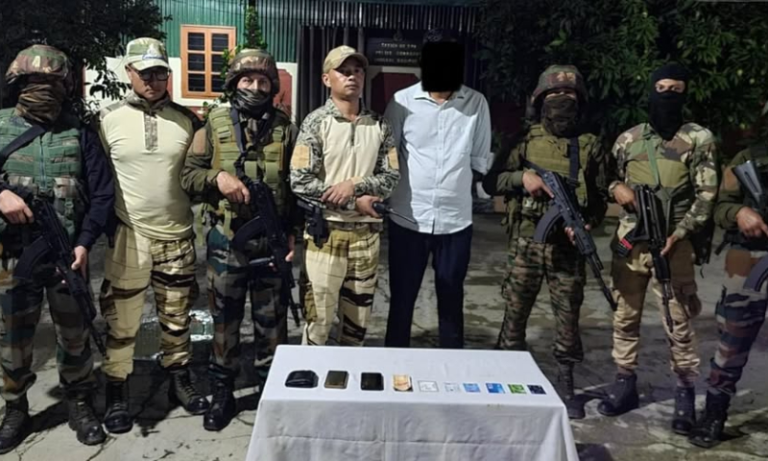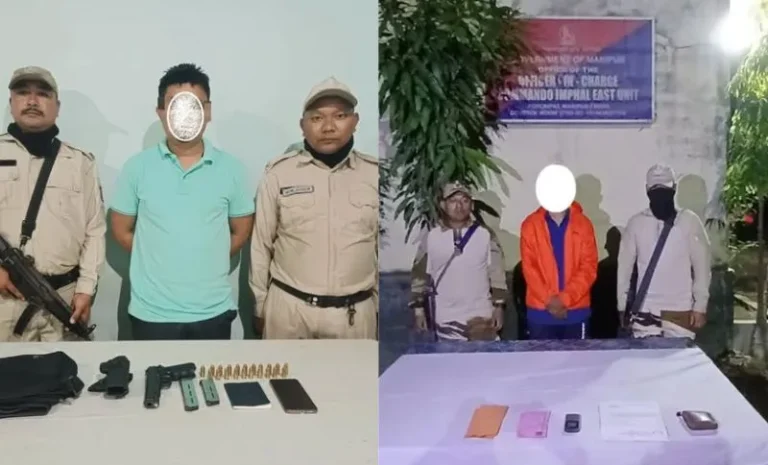Manipur: Jiribam Police Arrest Three For Fake ILP And Illegal Immigration
Short Summary
In January 2025, three individuals were arrested in Jiribam, Manipur, for possessing fake Inner Line Permits (ILP) and involvement in illegal immigration. The arrests began on January 9, when Sambabu Rabidas was found with a counterfeit ILP issued by the Deputy Commissioner’s Office in Tamenglong. Two more arrests followed: Jitendra Kumar, a staff member from the same office, and Gaiphulung Bosco Pamei, who worked in the ILP issuing section. Authorities are continuing investigations to address illegal immigration and uphold the integrity of the ILP system.
Long Article
In a significant operation, the police in Jiribam, Manipur, arrested three individuals suspected of involvement in illegal immigration activities and the possession of counterfeit Inner Line Permits (ILP). The arrests, which occurred between January 9 and January 19, 2025, shine a spotlight on the growing issue of forged documents being used to facilitate unauthorized entry into the state. Let’s dive into the details of the case and the ongoing investigations that have captured the attention of local authorities.
What Are Inner Line Permits (ILP)?
To understand the gravity of the situation, it’s crucial to know what ILPs are and why they’re essential in regions like Manipur. The Inner Line Permit is an official travel document required for Indian citizens from other states to enter certain protected areas in the Northeast, including Manipur. It helps regulate immigration and protects the rights and land of indigenous communities in the region. The ILP system was put in place to prevent the influx of people from outside the state and maintain the integrity of local cultures and resources.
The Arrests: A Closer Look at the Incident
The Jiribam police made their first arrest on January 9, 2025, when Sambabu Rabidas, a resident of Kaptanpur Part-16 in Rangirkhari, was found in possession of a fake Labour ILP. This ILP, which appeared to be issued by the Deputy Commissioner’s Office of Tamenglong, was quickly flagged by the police as counterfeit. Rabidas’ possession of the forged document raised red flags about possible illegal immigration networks operating within the region.
As the investigation progressed, the police made two additional arrests. Jitendra Kumar, a staff member at the Deputy Commissioner’s Office in Tamenglong, was apprehended for allegedly assisting in the creation or distribution of fake ILPs. Further investigation led to the arrest of Gaiphulung Bosco Pamei, another employee at the same office working in the ILP issuing section. Pamei’s arrest on January 19, 2025, indicated a more systemic problem within the office, suggesting that some insiders might be involved in the illegal issuance of these permits.
The Significance of the Arrests
The arrests in Jiribam have sparked widespread concern regarding illegal immigration and document fraud in Manipur. These arrests not only highlight the growing issue of forged ILPs but also raise questions about the effectiveness of the current monitoring systems in place. The fact that individuals working within the ILP issuing office were allegedly involved in the fraud further underscores the challenges faced by local authorities in controlling immigration and maintaining the integrity of the ILP system.
Illegal immigration has been a sensitive and contentious issue in the Northeast, with many indigenous communities fearing that unchecked migration from other parts of India, and even neighboring countries, could erode their cultural identity and take a toll on local resources. The presence of fake ILPs complicates efforts to monitor and control this problem.
The Role of the ILP System in Maintaining Regional Security
The Inner Line Permit system serves as a vital tool for maintaining regional security and preserving the cultural identity of the indigenous communities in Manipur. By requiring people from outside the state to obtain permission before entering, the ILP system regulates migration and helps prevent the settlement of non-indigenous populations. However, the existence of counterfeit ILPs jeopardizes these efforts, as it allows individuals to bypass the regulatory system and gain entry to the state unlawfully.
In recent years, the rise in fake ILP cases has drawn attention to potential loopholes in the system. The involvement of individuals from within government offices in such fraudulent activities suggests that tighter controls and more stringent checks may be necessary to curb the growing trend of document forgery.
The Investigation and What Comes Next
Following the arrests, the Jiribam District Police have registered a case and launched an extensive investigation into the matter. Authorities are looking into the possible extent of the illegal immigration networks and examining how these fake ILPs were being issued, distributed, and used. The investigation is also focused on identifying others involved in the fraud and whether similar cases exist in other regions of Manipur.
Authorities are also reviewing the processes in place for the issuance of ILPs, with an eye on strengthening the system and implementing better verification procedures to prevent further misuse. The police are working with immigration and border security agencies to ensure that no illegal immigrants slip through the cracks.
The Community’s Response to the Arrests
The local community has expressed mixed reactions to the arrests. While many are relieved to see law enforcement taking action, there is also concern about the broader implications of such fraudulent activities. Some worry that these incidents could lead to further divisions between indigenous and non-indigenous groups, particularly when it comes to issues of land and resources. The arrests have also prompted discussions about the need for more robust enforcement mechanisms to tackle illegal immigration and maintain the integrity of the ILP system.
What Can Be Done to Prevent Future Frauds?
To address the rising problem of fake ILPs, several measures can be taken. One crucial step is increasing transparency and oversight within government offices involved in the issuance of ILPs. Regular audits and stringent checks could help identify and prevent fraud at the earliest stage. Additionally, technology can play a key role in combating document forgery. Implementing digital ILPs with embedded security features could make it more difficult for counterfeit documents to be produced.
Another important step is raising awareness among the public about the legal requirements for obtaining an ILP and the consequences of using forged documents. Public education campaigns could help reduce the demand for fake ILPs, which would in turn reduce the number of people attempting to cross into Manipur illegally.
Conclusion
The arrest of three individuals involved in the possession of fake ILPs and illegal immigration marks an important development in the ongoing efforts to combat illegal entry into Manipur. While the immediate arrests are a positive step, much work remains to be done to ensure that the ILP system is secure and effective. As the investigation continues, local authorities will need to implement stronger safeguards and collaborate more closely with immigration agencies to prevent similar incidents from occurring in the future.
FAQs
- What is the Inner Line Permit (ILP)? The ILP is a travel document required for citizens of other states to enter specific protected areas in Northeast India, including Manipur.
- Why is the ILP system important? It helps regulate immigration and protect the rights and resources of indigenous communities in sensitive regions.
- What happened in the recent Jiribam police arrests? Three individuals were arrested for possessing fake ILPs and being involved in illegal immigration activities.
- How were the fake ILPs discovered? The counterfeit documents were flagged by the police during routine checks, leading to the arrests.
- What measures can be taken to prevent future ILP fraud? Increased transparency, digitalization of ILPs, and public awareness campaigns are essential steps to reduce document fraud and illegal immigration.



